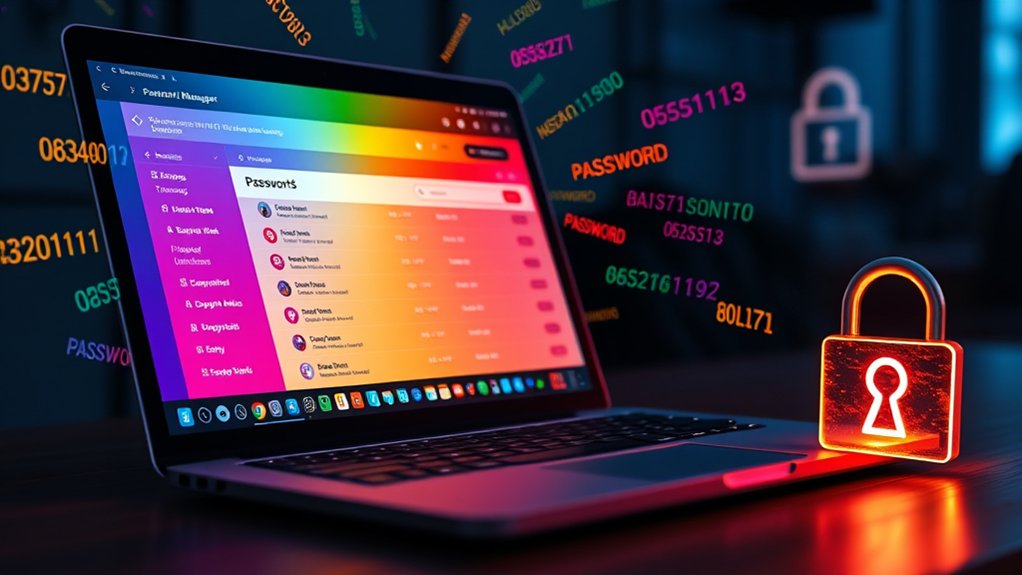Determining the best password manager for cybersecurity needs involves evaluating key features. Effective management hinges on encryption standards like AES-256 and zero-knowledge architecture, safeguarding user credentials. Prominent options include Bitwarden and NordPass, offering free tiers with limited features. Premium plans begin at approximately $1.43 per month, providing advanced services. Users benefit from multi-factor authentication, password audits, and breach alerts. Such all-encompassing functionality bolsters security measures. Further exploration reveals additional factors influencing password manager selection.

As cyber threats continue to evolve, individuals and organizations increasingly recognize the importance of secure password management. With sensitive information at stake, selecting a suitable password manager becomes critical. Leading options, such as NordPass and 1Password, excel through various security features, including advanced encryption standards like xChaCha20 and AES-256. These technologies provide strong protection, effectively safeguarding user data from unauthorized access.
The implementation of a zero-knowledge architecture is another key aspect of reputable password managers. This design guarantees that only users can access their credentials, markedly improving privacy. Measures like multi-factor authentication further strengthen security, necessitating multiple verification methods to unlock password vaults. Regular updates and changes to passwords are also crucial in maintaining ongoing security. Additionally, 1Password’s travel mode allows users to temporarily hide sensitive information when crossing borders, enhancing data safety during travel. Password managers also promote password complexity by encouraging users to create unique combinations for enhanced security.
A zero-knowledge architecture ensures only users can access their credentials, enhancing privacy and security with multi-factor authentication.
Moreover, many password managers offer data breach alerts, quickly notifying users should their stored credentials be compromised.
Pricing structures vary among password managers, catering to diverse needs. Free tiers, offered by platforms like Bitwarden and NordPass, allow users to initiate secure password management at no cost, though they carry limitations in features. Premium plans, on the other hand, often start around $1.43 per month and incorporate advanced services such as secure sharing and thorough breach reports. Family and business plans, like Keeper’s Business Starter plan priced at $7.00 per user, improve usability for collective management.
User experience plays an important role in the effectiveness of a password manager. Cross-platform compatibility across devices is standard among leading options, allowing seamless access regardless of the user’s operating system. Intuitive designs and features such as autofill and autosave greatly streamline the login process, addressing user convenience. The incorporation of biometric logins further improves security while promoting accessibility.
Ultimately, factors such as password generators, password audits, and dark web monitoring are crucial features that contribute to an effective cybersecurity posture. While cloud-based managers offer easy access, local and browser-based alternatives cater to different security preferences. Careful consideration of these aspects is vital for those seeking the best password manager to safeguard their digital lives.
Frequently Asked Questions
Are Free Password Managers Safe to Use?
The safety of free password managers varies greatly based on their features and reputations. Many utilize strong encryption, like AES-256, to protect user data and offer two-factor authentication for added security.
Nevertheless, limitations may include fewer breach protection measures compared to premium versions. Users should make sure they select well-reviewed options, like Dashlane or Proton Pass, and implement best practices, such as creating strong master passwords and enabling two-factor authentication, to improve protection.
Can Password Managers Help With Two-Factor Authentication?
Password managers greatly improve security when used alongside two-factor authentication (2FA). They securely store 2FA tokens alongside passwords, facilitating streamlined account access.
A study by Cybersecurity Ventures indicates that 2FA can block 99.9% of automated attacks. Additionally, password managers alert users to compromised accounts, contributing to overall data protection.
Conversely, the reliance on a single master password poses risks, emphasizing the need for both strong master passwords and vigilant 2FA utilization.
How Do I Transition From One Password Manager to Another?
Shifting between password managers involves several critical steps. Users must first assess import and export functionalities, often leveraging CSV file formats to simplify the process.
Attention to security is paramount, particularly regarding encryption methods like AES-256. After migration, it is advisable to verify data accuracy and change passwords to mitigate risks from previous breaches.
Finally, maintaining effective customer support and regular audits can improve user confidence during this shift, ensuring a secure experience.
What Happens if I Forget My Master Password?
Forgetting a master password can result in significant consequences, primarily loss of access to all stored passwords and sensitive data.
Most password managers lack a reset option for the master password, complicating recovery efforts. This situation highlights the importance of establishing recovery mechanisms, such as recovery keys.
Without such precautions, data remains encrypted and inaccessible, further exemplifying the critical need for users to remember or securely manage their master passwords.
Are There Password Managers Compatible With All Devices?
Numerous password managers provide cross-platform compatibility, ensuring accessibility across multiple devices.
For instance, NordPass and Dashlane offer seamless integration across various operating systems, including Windows, macOS, iOS, and Android. Bitwarden extends its compatibility to Windows, macOS, Linux, and multiple browsers.
Conversely, KeePassXC supports only selected platforms, restricting some users’ experiences.









